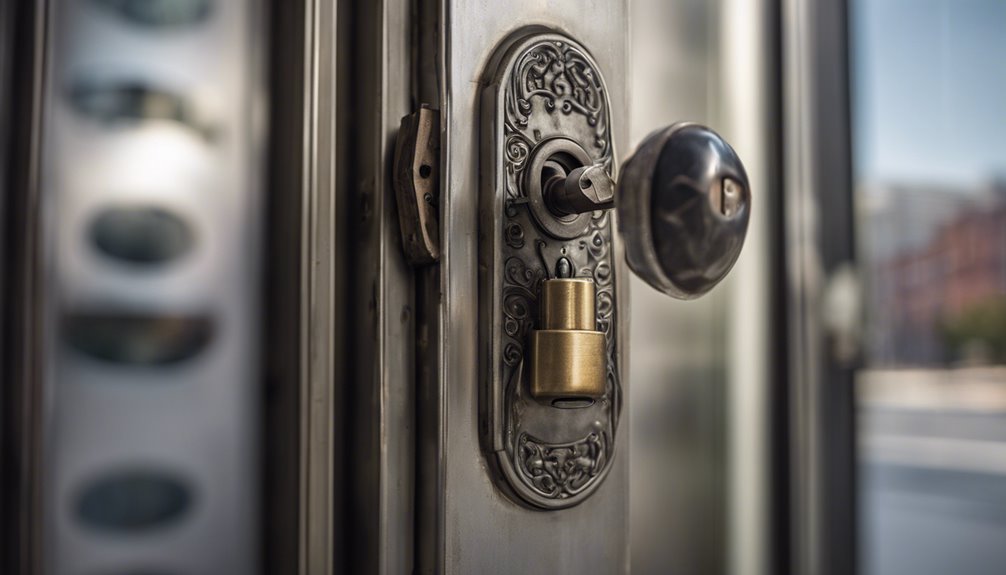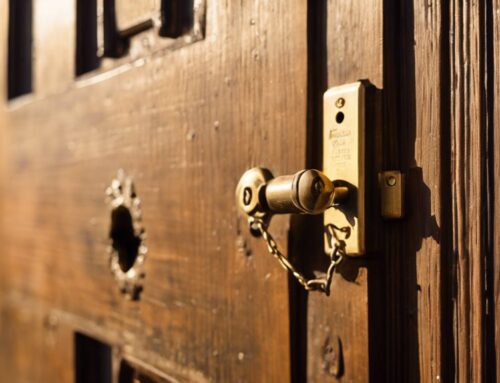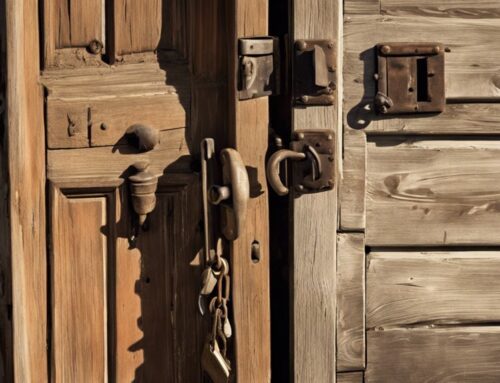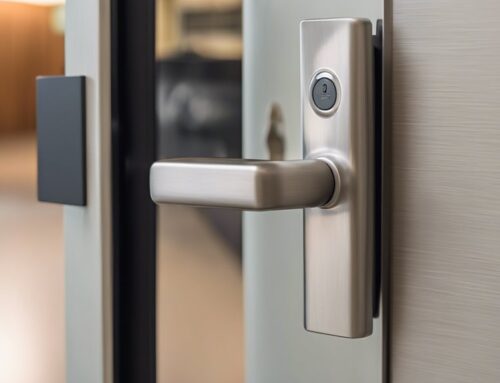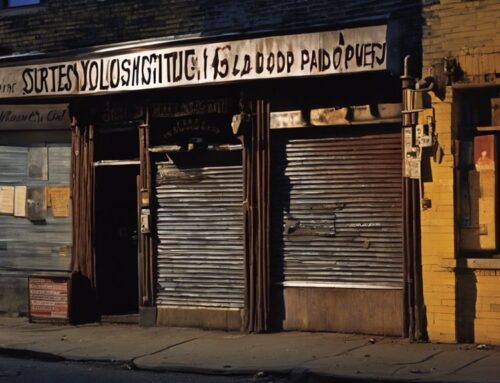Imagine standing at the entrance of your business, a heavy-duty lock glinting in the afternoon sun, symbolizing the security you've chosen for your assets. But have you considered the specific standards you need to meet for high-security locks in Pennsylvania? From compliance with safety regulations to the importance of professional installation, there are many layers to this process. Uncovering these requirements could be the key to not just safeguarding your business, but also ensuring you remain compliant in a rapidly changing environment.
Key Takeaways
- High-security locks must comply with local and state building codes regarding their installation and accessibility requirements in Pennsylvania.
- Installation should align with UL 1037 standards to ensure reliability and effectiveness in preventing unauthorized access.
- Professional locksmiths should be familiar with Pennsylvania-specific key duplication laws and ensure compliance during installation and key management.
- Regular audits of key usage and access logs are essential for maintaining security and ensuring adherence to established protocols.
- Ongoing training for locksmiths on installation and safety standards is crucial to ensure compliance with evolving security requirements in Pennsylvania.
Overview of High-Security Locks
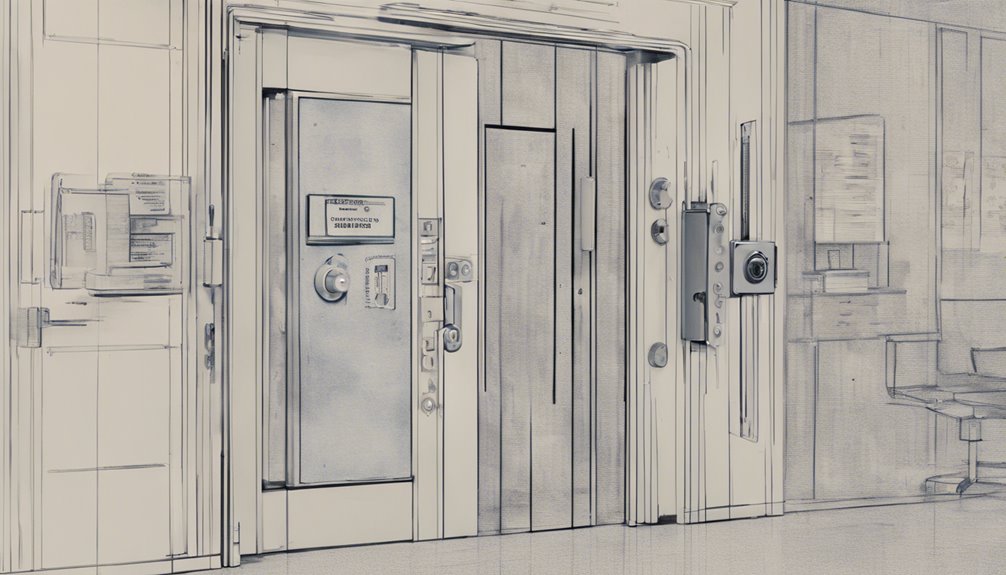
Though you may be familiar with standard locking mechanisms, high-security locks represent a notable advancement in security technology, specifically designed to protect your business against unauthorized access. These locks feature restricted keyways that thwart unauthorized duplication, making it difficult for intruders to create working keys.
Complex keying systems utilize patent-protected designs to control who can cut and distribute keys, ensuring that only trusted individuals have access. One standout characteristic is the high number of key differs. This complexity reduces the chances of cross keying and supports intricate master key configurations, tailoring access to your specific needs.
The unique mechanisms within high-security locks, such as security pins and sidebars, are engineered to resist manipulation. Digital locks, which are a subset of high-security locks, are subject to specific regulations that locksmiths need to understand to remain compliant. To further reinforce security, these locks are built with pick and drill resistance, utilizing advanced materials and designs that withstand forced entry attempts. Additionally, high-security locks are often subject to various security ratings that assess their performance and reliability, ensuring that they meet stringent safety standards.
In Pennsylvania, it is crucial for property owners and locksmiths to adhere to essential safety standards to ensure their locks provide adequate protection and comply with legal requirements. Moreover, high-security locks often come with restricted key duplication processes, requiring a special card or authorized machine to create duplicates, which greatly reduces unauthorized access. They can even be reset if a key is lost, providing a cost-effective alternative to lock replacement.
Some systems can track key usage through audit trails and offer remote access control, enhancing your managerial capabilities.
Federal and Military Specifications
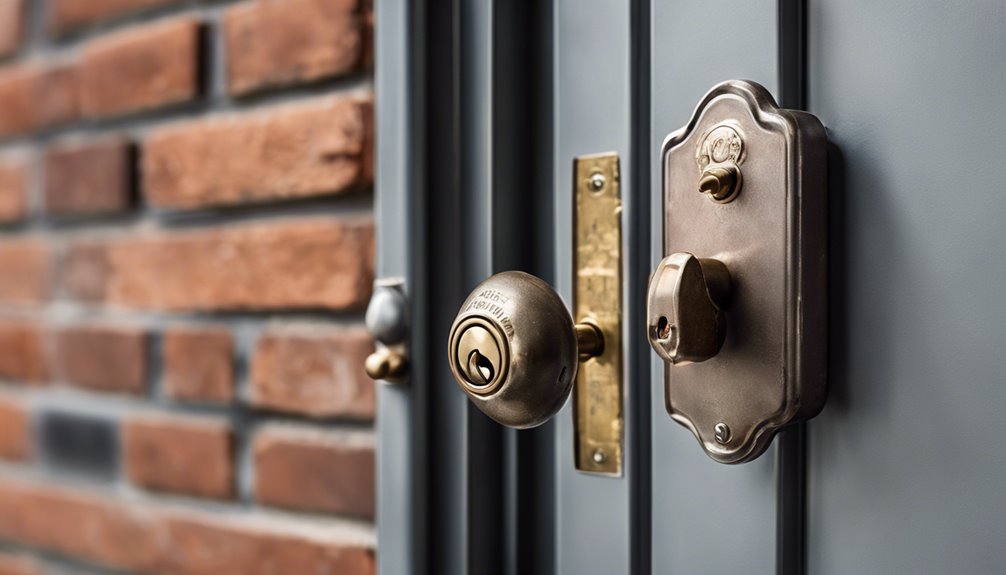
Understanding the federal and military specifications for high-security locks is vital for businesses seeking ideal protection and compliance with security standards. The Federal Specification FF-L-2740 outlines the requirements for changeable combination locks, particularly the X-10 lock, which is self-powered and suitable for GSA-approved security containers and vault doors. This specificity is significant as it guarantees that your locks can effectively protect classified and national security information against manipulation and forced entry.
On the military side, specifications like MIL-DTL-43607 and MIL-DTL-29181 mandate that high-security locks, such as key-operated, shrouded padlocks and hasps, are employed for securing sensitive areas—like nuclear weapon storage. These locks are rigorously tested to withstand dynamic and static forces, assuring robust security. Furthermore, the X-10 lock is designed to be a manipulation proof solution, enhancing the protection of sensitive information.
Additionally, pedestrian door locks must comply with FF-L-2890 to confirm quick egress in emergencies, underscoring the balance between security and safety. Insurance policies like general liability and professional indemnity are essential for locksmiths installing these high-security systems to protect against accidents and service errors.
Further, incorporating state-of-the-art lock features like internal relock triggers and audit functionalities can greatly enhance security. Compliance with GSA and Underwriters Laboratories (UL) standards reinforces the reliability of your locking systems. In Pennsylvania, obtaining a locksmith license is crucial for ensuring legal compliance and gaining professional recognition when working with these high-security systems.
Always verify proper record-keeping for tampering marks and service history to maintain the integrity of your high-security setup. Familiarizing yourself with these specifications not only allows for enhanced protection but also solidifies your business's commitment to maintaining the highest security standards.
Installation Best Practices

When installing high-security locks, precise planning and adherence to regulations are essential to guarantee ideal protection and compliance. Locksmiths in Pennsylvania should also be aware of their legal responsibilities in the event of break-ins, as they can be held liable if the locks fail due to improper installation. One crucial aspect to consider is the penalties for operating as an unlicensed locksmith, which can include fines and legal consequences.
Begin by carefully selecting the appropriate location and placement. Confirm that high-security locks and key boxes are installed in approved areas, as determined by local fire code officials. For Knox Boxes, position them for visibility from the street, ideally mounted between 4 to 6 feet above the ground on robust structural components like brick or wood studs. This approach provides maximum security against tampering.
Next, focus on the type and approval of locks. Use locks that comply with UL 1037 standards and meet rigorous performance criteria, including resistance to forced entry. Ensure that the locks chosen also adhere to military specifications, specifically high security padlocks, which enhances security through restricted access.
Commercial-grade Knox Boxes must be selected according to your building's needs, confirming compatibility with your broader security system.
Maintenance and key management also play vital roles. Keep keys in key boxes up-to-date and confirm they grant access to necessary areas. If you rekey or change locks, notify the fire code official promptly and secure the new key in the key box.
Label all key tags appropriately to enhance organization.
Lastly, bolster your security features. Install locks that incorporate deadbolts, electronic systems, or keyless entry features to enhance security.
Consider a hierarchical key structure for diverse access levels within your team, all while confirming compliance with local regulations. These best practices will safeguard your business and provide peace of mind.
Egress and Emergency Protocols
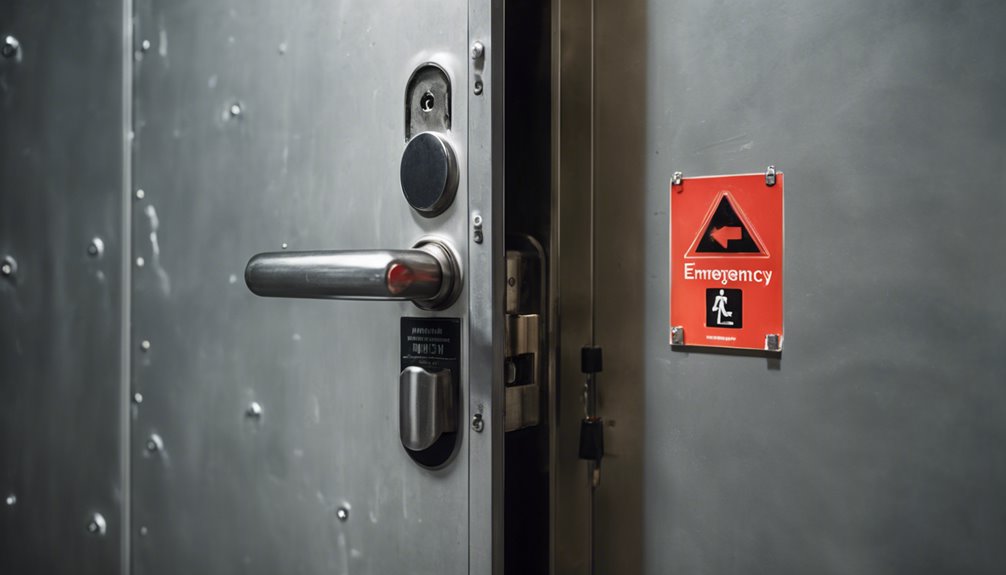
Effective egress and emergency protocols are vital for guaranteeing the safety of personnel in Pennsylvania businesses, especially those in multi-story buildings. To comply with regulations, you must include areas of refuge that are accessible from the spaces they serve. Clear signage, compliant with ICC A117.1 requirements, must mark these areas and be illuminated where needed.
Moreover, two-way communication systems are essential for providing a link between areas of refuge and the fire command center. This system should have a timed automatic dial-out capability to contact emergency services, securing rapid response in critical situations. Additionally, it must have audible and visible signals, particularly for floors above or below the level of exit discharge. In Pennsylvania, locksmiths play a crucial role in ensuring that the locking mechanisms comply with legal standards during eviction procedures, highlighting their responsibility in maintaining safety.
When designing means of egress, guarantee that doors open easily without requiring tools or keys from the egress side. Be mindful of using locking configurations that facilitate safe exit while addressing clinical needs when necessary. Locks should fail-safe, releasing upon power loss or activation of smoke detection systems. Remote opening may also be beneficial from a constantly attended location.
Finally, emergency exits must be conspicuously labeled and provide clear operational instructions. They should allow manual release from both inside and outside to promote quick access during emergencies. Additionally, businesses must ensure that their locks and security systems are ADA compliant to accommodate individuals with disabilities.
Key Management Policies
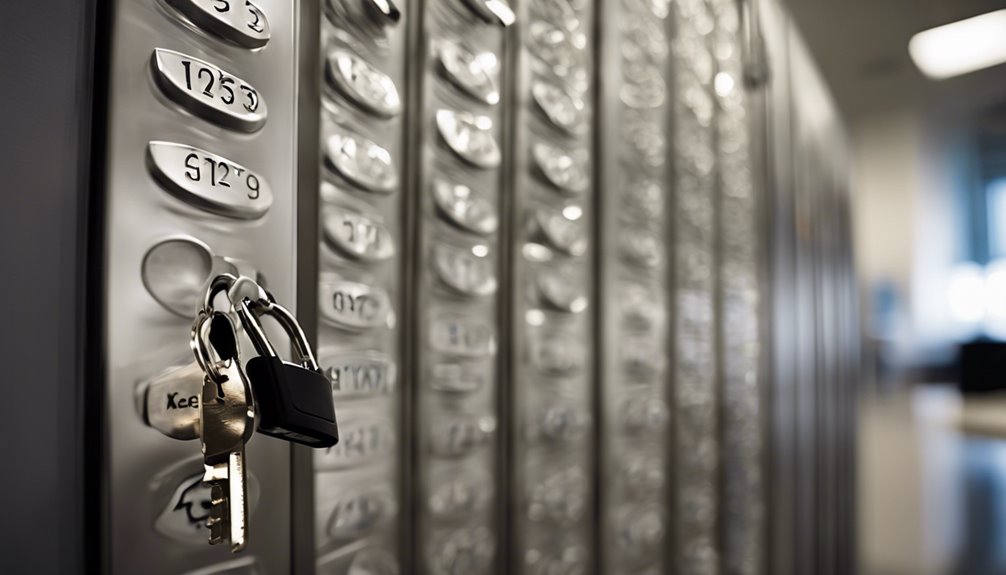
In any high-security environment, robust key management policies play a pivotal role in safeguarding assets and guaranteeing operational integrity. When you establish thorough key management procedures, you're setting a foundation for security that helps to mitigate risks effectively.
Here are three critical aspects to reflect on:
- Key Control and Custody: Assign the responsibility of your key and lock control program to a designated individual or group. Clearly document their duties, including tracking the location and status of all keys. Use secure storage containers for keys to prevent unauthorized access. In Pennsylvania, having lock picking tools in possession may be considered legal, but intent to commit a crime with those tools is not.
- Key and Lock Registration and Inventory: Maintain an up-to-date key and lock register that identifies each key's corresponding lock, along with its current custodian. Regularly audit these keys and locks, especially before and after custody changes. If you identify any lost keys or compromised locks, replace them promptly to maintain security.
- Access Control and Restrictions: Implement stringent access controls tailored to business needs. Limit access to essential areas based on who requires it and guarantee that sensitive locks remain secure. Always document any authorized creation of master keys.
In Pennsylvania, it's essential to be aware of the key duplication laws that govern the permissions and restrictions around duplicating keys, ensuring compliance with state regulations.
Servicing and Maintenance Guidelines
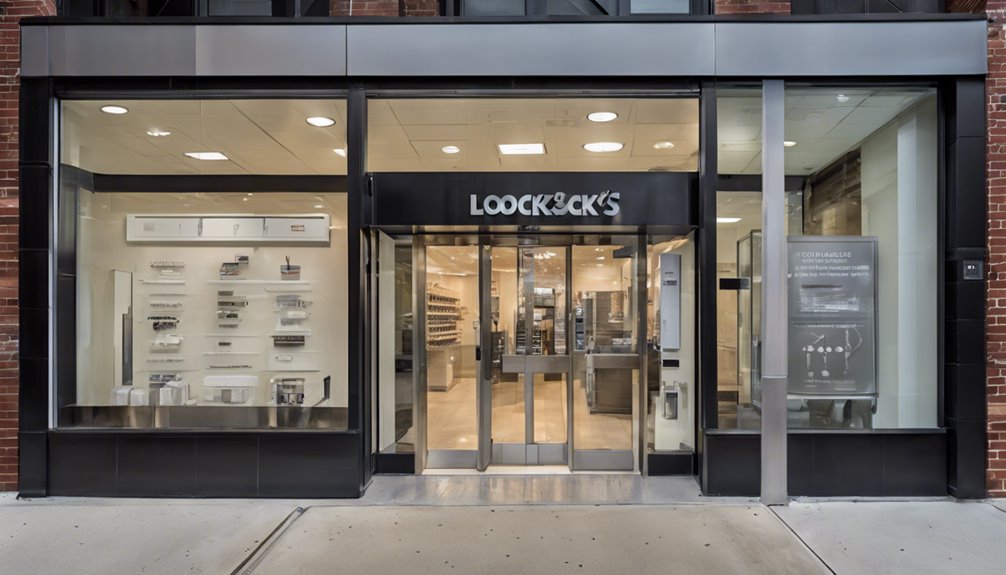
As you implement high-security locks in your business, establishing thorough servicing and maintenance guidelines is vital to guarantee their continued effectiveness and reliability.
Begin by ensuring that locks are properly installed, operable, and free from tampering signs. Utilize the correct strikeplate based on your door's specifications and complement high-security locks with military-standard shrouded hasps. For electric locks, integration with your alarm system is essential; use magnetic card keys or pushbutton systems for seamless access.
Service and repair your locks carefully. Either assign this task to a competent in-house employee with locksmithing skills or hire a screened contractor. Use maintenance keys for cylinder replacements while keeping all parts organized for reassembly. Certified technicians from Low Rate Locksmith can provide expert service and guidance in these tasks.
Schedule regular inspections to detect tampering or malfunction, maintaining a log of any findings and service performed. Establish a periodic maintenance schedule, ideally changing locks or rotating them annually, especially after lost keys.
Monthly audits of your keys and locks promote accountability. Each change of custody should trigger an inventory check to confirm key management policies.
When dealing with out-of-service high-security components, follow strict disposal protocols. Send these items to the appropriate disposal program to prevent unauthorized access, ensuring all parts remain together throughout the process.
Tracking disposal records as part of your overall security measures preserves the integrity of your security system. By adhering to these guidelines, you reinforce the security of your business while maintaining the freedom you value.
In Pennsylvania, aspiring locksmiths can learn about the specific guidelines governing locksmith apprenticeships, which include certification, training, and legal requirements.
Compliance and Documentation Standards
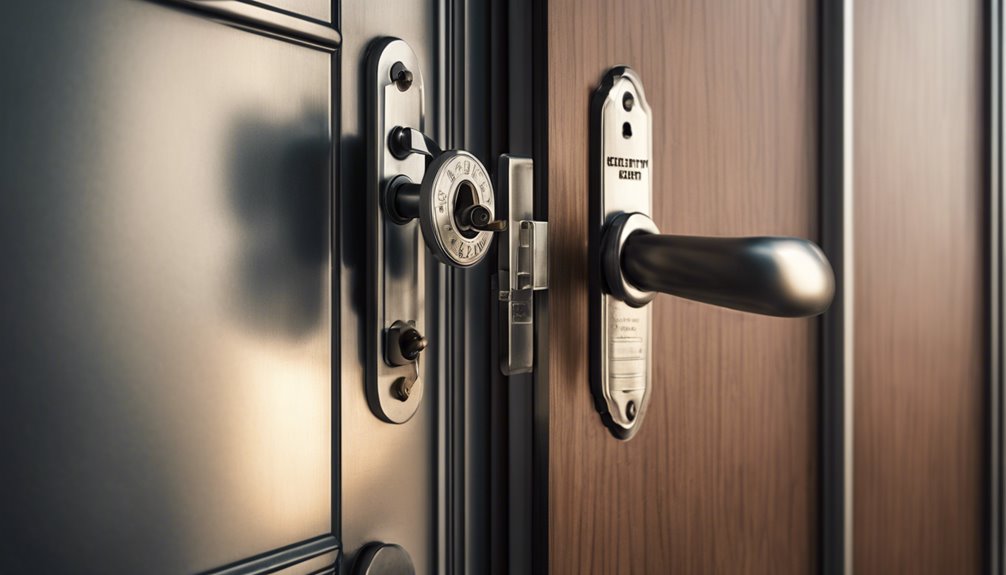
To guarantee your high-security lock systems meet necessary legal and safety requirements, compliance with local ordinances is critical. Proper installation of high-security lock boxes guarantees that emergency personnel can access your facility efficiently.
Here are three key compliance and documentation essentials to evaluate:
1. Installation Standards: Verify your high-security key lock boxes are securely attached using through bolts and marked clearly. Depending on local directives, multiple lock boxes may be needed. Ensure that all installations are conducted by certified technicians to comply with state regulations and standards.
2. Content Requirements: Your key lock box should compile all keys, access codes, and fobs for secured areas. Include current floor plans detailing utility disconnects and emergency contacts.
It's essential that emergency contact information remains up-to-date and that any changes in box contents are communicated to the Township Manager.
3. Inspection Protocols: After installation, a site visit with the Township Manager or designee is necessary for approval. The Fire Department must inspect the lock box and install access keys.
Regular inspections will help maintain ongoing compliance with ordinances and guarantee emergency access remains unobstructed.
Locksmiths in Pennsylvania must also be aware of their employment rights to ensure fair treatment and protection under local labor laws.
Adhering to these compliance and documentation standards not only protects your business but also enhances the safety of your employees and customers.
Importance of Professional Installation
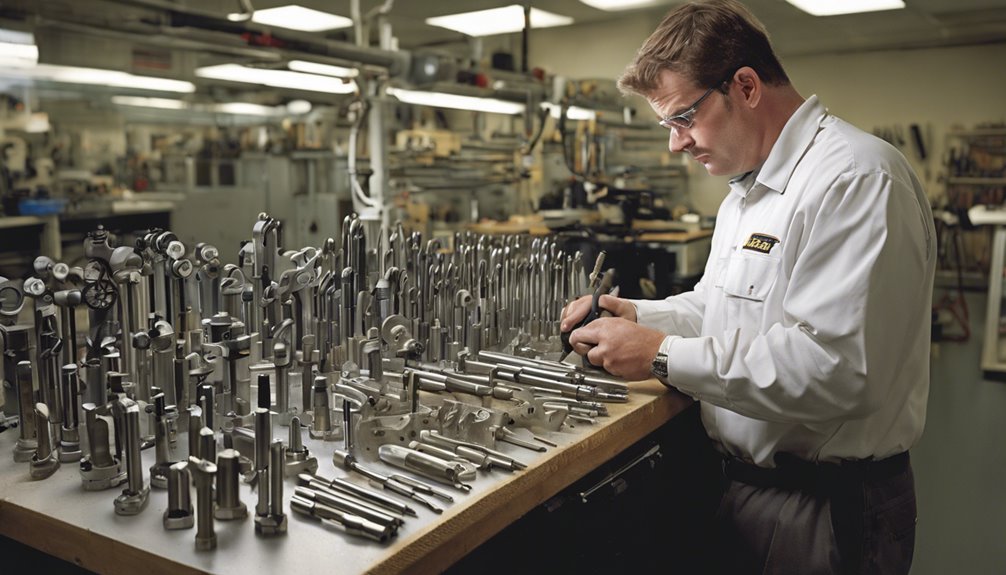
Guaranteeing compliance with local ordinances is just one part of maintaining a secure business environment; the quality of lock installation plays a significant role in overall security effectiveness. When you opt for professional installation, you leverage specialized skills and knowledge that directly impact how well your locks function.
These trained locksmiths prevent common installation issues, like misaligned locks or incorrect bolt placements, that can compromise security.
Professional locksmiths don't just install any lock; they assess your specific needs and recommend customized solutions. Whether it's access control systems, master key setups, or high-security locks, their tailored approach considers both security level and operational efficiency.
Additionally, high-quality hardware is essential, as experts utilize durable components resistant to tampering.
Moreover, they employ advanced tools that guarantee precise and efficient installations, minimizing errors that could lead to vulnerabilities.
A significant part of professional installation is the rigorous testing process, where they check the functionality and resistance of the locks against potential threats.
Final inspections ensure that standards are met and that the installation integrates seamlessly into your existing security system.
Locksmiths also play an important role in foreclosure processes, highlighting their legal responsibilities and operational practices.
Enhancing Security With Technology
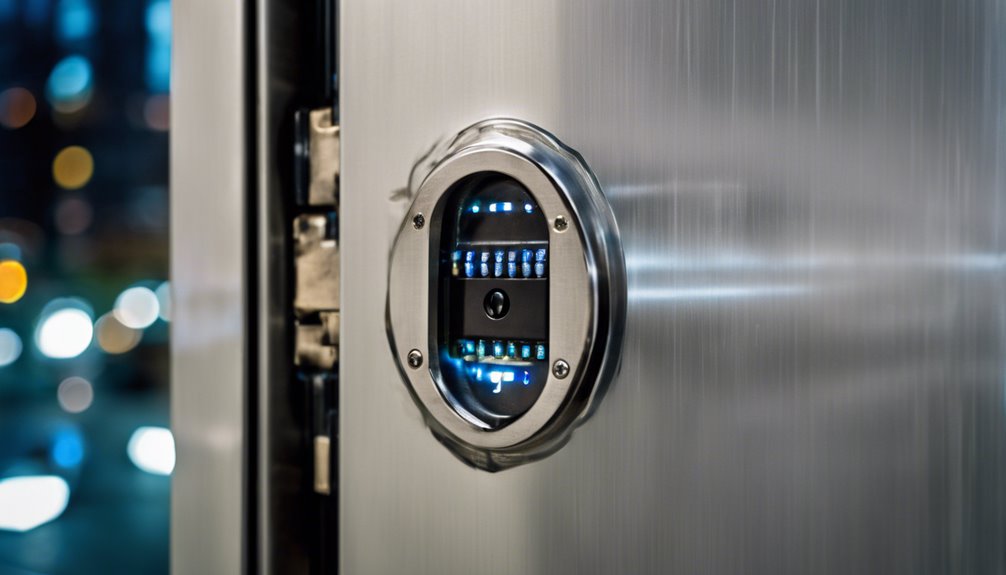
To enhance security in your business, consider adopting innovative locking solutions that provide a high level of resistance against unauthorized access.
Advanced access control systems, such as keycard and biometric options, allow you to manage who enters specific areas while monitoring access patterns in real time.
Innovative Locking Solutions
As businesses increasingly prioritize security, innovative locking solutions have emerged that blend traditional mechanisms with cutting-edge technology. These "smart" locks revolutionize how you secure your property, offering enhanced protection and control over access.
By integrating features that utilize digital advancements, you can experience a new level of security.
Here are three key benefits of innovative locking solutions:
- Remote Control: Manage who enters your premises from anywhere, allowing for real-time adjustments to access permissions.
- Biometric Identification: Use unique traits like fingerprints or facial recognition to guarantee only authorized individuals gain entry.
- Customizable Access: Create tailored schedules, making it easy to determine when specific employees can access certain areas.
With these solutions, you not only bolster your security but also streamline management processes.
Advanced technologies like encrypted codes and cloud integration provide further protection against unauthorized access while enhancing your ability to monitor activities in real-time.
As you consider updating your locking systems, embracing these innovative solutions can lead to a significant leap in safeguarding your business without compromising your freedom or efficiency.
Advanced Access Control Systems
Advanced access control systems represent a critical advancement in modern security solutions, seamlessly integrating technology to enhance protection for businesses. You can stay ahead of potential security breaches with features like biometric verification, smart cards, and multi-factor authentication. These systems create unique identifiers to guarantee accurate identification of individuals.
Here's a quick comparison of advanced features:
| Feature | Description | Benefits |
|---|---|---|
| Biometric Verification | Uses unique physical characteristics for identity | High security prevents unauthorized access |
| Centralized Management | Easy user management with customizable permissions | Streamlined operations for quick adjustments |
| Real-Time Monitoring | Generates detailed logs for access activities | Enhances security response and auditing |
| Integration and Scalability | Compatibility with existing systems | Supports growth and adaptability |
With centralized management capabilities, you can adjust user access swiftly. Additionally, real-time monitoring and robust audit trails facilitate a detailed review of activities. By integrating these systems with other security measures like CCTV, you increase overall effectiveness. Embracing advanced access control isn't just about locking doors; it's about fortifying your freedom and security with intelligent technology.
Ongoing Training and Education
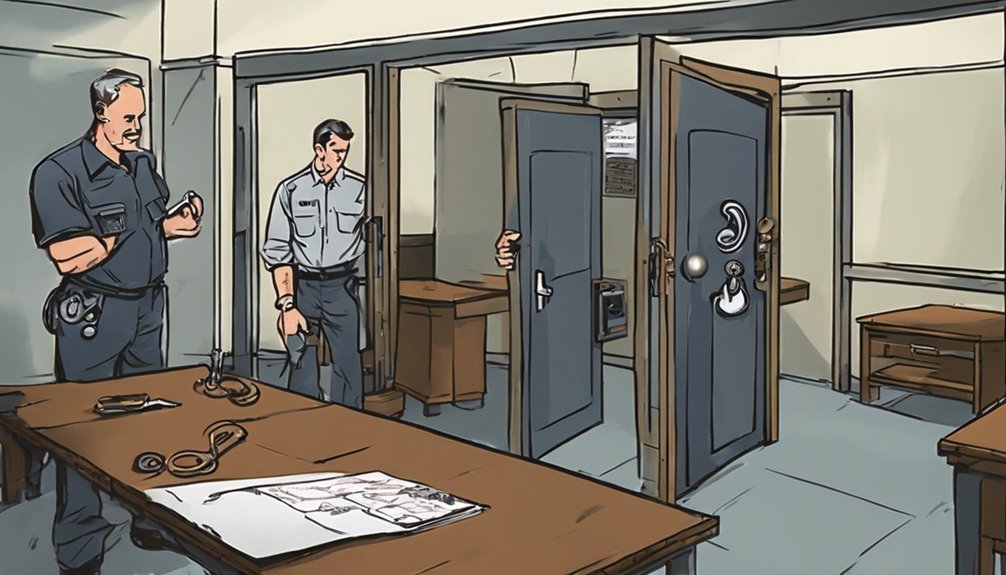
While the locksmithing industry evolves rapidly, ongoing training and education are fundamental for professionals to maintain their expertise and compliance with industry standards.
Staying informed about the latest developments helps you provide high-quality security services and protects your clients' assets.
Here are three key areas you should focus on for ongoing education:
1. Certification Requirements
You'll need proper certifications that cover installation, maintenance, and repair of locks. Staying updated validates your skills while guaranteeing compliance with state-specific regulations.
2. Safety and Health Standards
Familiarize yourself with OSHA compliance requirements. Regular training on safety codes not only protects you but also guarantees that you handle tools and equipment safely, minimizing workplace accidents.
3. Specialized Locking Systems Training
With the complexity of today's locking systems, it's essential to understand specialized regulations, especially those concerning Department of Defense standards. This training enhances your ability to work in high-security environments where precision is critical.
As the landscape of security continues to change, committing to ongoing education safeguards your place in the industry.
Not only does this dedication protect your professional integrity, but it also empowers you to offer peace of mind to your clients.
Frequently Asked Questions
What Are the Costs Associated With High-Security Lock Installation?
When you're considering high-security lock installation, expect costs to range considerably. The locks themselves might start around $100 but can exceed $500 for premium options.
Labor rates typically fall between $50 to $100 per hour, increasing for emergencies. Additional expenses may arise from complexities like door modifications and required hardware.
If you're integrating smart features, the costs could climb even higher. Overall, budgeting for both materials and installation is essential to guarantee lasting security.
Can High-Security Locks Be Retrofitted to Existing Doors?
Yes, you can retrofit high-security locks to existing doors. These locks enhance your security without the need for complete replacements.
Options like interchangeable core locks or biometric modules allow you to upgrade while maintaining your current hardware. The installation often requires minimal alterations, preserving your original investment and saving costs associated with rekeying.
Ultimately, retrofitting combines advanced security features with existing installations, providing you with flexibility and improved safety.
Are High-Security Locks Resistant to All Types of Weather?
High-security locks are generally designed to withstand various weather conditions. They often feature corrosion-resistant materials like brass and stainless steel, enhanced by protective vinyl coatings.
With robust bodies and shrouded shackles, these locks resist dirt and elements, guaranteeing durability in harsh environments.
However, while they offer significant resistance to the weather, no lock is entirely immune. Regular maintenance and inspections are essential to verify they're functioning at peak performance against external conditions.
How Often Should High-Security Locks Be Replaced?
You should replace high-security locks every 6 months to 2 years, depending on usage and traffic in your facility.
In high-traffic areas, locks face heavy wear and tear, so more frequent replacements are necessary.
If you experience employee turnover or security breaches, rekeying is critical and should be done immediately.
Regular audits of key access and maintenance of lock systems will help you manage and secure your premises effectively.
What Are the Common Brands of High-Security Locks Available?
When it comes to choosing high-security locks, you'll find a plethora of prominent players promising protection.
Medeco's models provide robust resistance, while EVVA introduces innovative magnetic systems.
For those seeking electronic options, the ASSA ABLOY Protec2 CLIQ integrates mechanical features flawlessly.
Combine thorough capabilities with certified durability, and you'll secure your space effectively.
A blend of brands guarantees you can opt for the best fit to safeguard your freedoms and assets.
Conclusion
In conclusion, installing high-security locks in Pennsylvania isn't just a good idea—it's a necessity that can make or break your business security. By adhering to standards, engaging licensed professionals, and implementing robust key management, you're not just securing your premises; you're fortifying your fortress against potential threats. Don't underestimate the power of compliance and technology in creating an impenetrable defense. Stay vigilant, invest wisely, and guarantee your business remains a bastion of safety.

